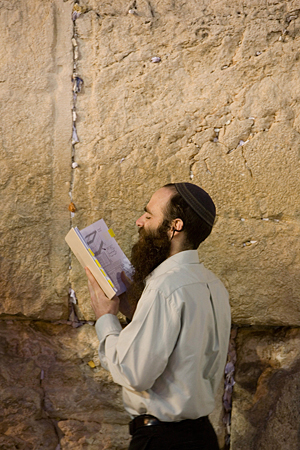In November 1977, a group of conservative Christian leaders signed a full-page advertisement in The New York Times expressing their concern over international negotiations surrounding the permanent boundaries of Israel and the apparent pro-Arab tilt of American foreign policy.
 The establishment of the Israeli state in 1948 has returned the Jewish people to a place of worship within their historical context.
The establishment of the Israeli state in 1948 has returned the Jewish people to a place of worship within their historical context.To the evangelical leaders, among them the famed pastor of First Baptist Church in Dallas, W.A. Criswell, all of the land west of the Jordan was Israel’s. The land was theirs by “divine right,” not because they had seized it in the Six Day and Yom Kippur wars. God had promised the land to the people of Israel.
In reality, Criswell’s support of Israel was nothing new among Southern Baptists in 1977. The birth of the nation 60 years ago on May 14, 1948, may have initiated political discussion, but the Jewish people were a focus of the Southern Baptist Convention as early as 1873.
In that year’s annual meeting in Mobile, Ala., Southern Baptists noted the rising tide of anti-Semitism and proclaimed their “unspeakable indebtedness to the seed of Abraham.” They also recognized the Jews’ “peculiar claims upon the sympathies and prayers of all Gentile Christians,” and at the same time recorded the convention’s “earnest desire to partake in the glorious work of hastening the day when the superscription of the Cross shall be the confession of all Israel, ‘Jesus of Nazareth, the King of the Jews.’?”
Two years later in Charleston, S.C., a resolution on evangelism noted the convention’s desire to appoint a missionary to the Jews. And in May 1896 in Chattanooga, Tenn., the convention noted as “eminently important and desirable the establishment of a representative Baptist mission in Palestine, with headquarters in Jerusalem.”
Jim Sibley, director of the Pasche Institute of Jewish Studies at Criswell College in Dallas and a 14-year veteran of Southern Baptist work in Israel, said such depictions of concern for the Jews and their homeland reflected Southern Baptists’ commitment to prophetic views that included Israel even before the nation was conceived.
“Most Southern Baptist laypeople were premillennialists then, even if their seminary-trained ministers were not,” Sibley said. “That means they expected the Jews, as they read in the Bible, to return to the land as a literal sign of the end of the age, prior to the return of Christ and before his 1,000-year reign on earth. Certainly, Southern Baptists have seen the return of the Jews to Palestine and the birth of Israel in 1948 as the movement of the hand of God, and as the fulfillment of prophecy.”
According to Richard Land, however, the realization that the founding of Israel was a fulfillment of prophecy came later for some. Most of his seminary classmates were amillennialists, meaning they did not believe in a literal 1,000-year reign of Christ on earth after his second coming. They didn’t change their opinions until after the Six Day War in 1967, he said.
“For Southern Baptists, the return of the Jews to the land of promise in great numbers after World War II has helped promulgate premillennialism among Southern Baptists,” Land said. “But many people with whom I went to seminary in the late 1960s and early 1970s were amillennial in their eschatological outlook. The attack on Israel helped change that, and today the majority of Southern Baptists are premillennialists.”
In many respects, that shift away from one eschatological viewpoint to another in Southern Baptist life wasn’t a new phenomenon. World War I proved the death knell for postmillennialism among seminary professors and seminary-trained clergy. Postmillennialism was the view that the church would lead the world into 1,000 years of peace and prosperity, followed by Christ’s return.
Whenever the shift occurred, Southern Baptists’ “positive attitude” toward the Jews and later Israel, Sibley said, can be seen throughout the convention’s history, even though missionaries weren’t sent to Palestine until 1921 – 76 years after the then-Foreign Mission Board was founded.
The tradition of supporting the Jews continued in 1972 and 1981 when Southern Baptists again adopted resolutions addressing anti-Semitism, which was said to be growing in the Middle East and worldwide as Israel refused to surrender land it had claimed – the West Bank, Gaza Strip and Golan Heights – during its wars of defense with its Arab neighbors. Those statements of support were well received by Israeli leaders and, for years, also by Jews in America.
But it was an expression of love for the Jews in 1996 that threatened to torpedo Southern Baptists’ relationship with them.
‘To the Jew first’
The first Southern Baptist workers may have been appointed to Jerusalem in 1921, but it was another 77 years before the convention appointed a missionary to the Jews in America.
The Jews, Sibley said, had been regarded as one group among a thousand others still categorized as “unreached peoples” by many in Southern Baptist life. And at least one director of the then-Home Mission Board in the 1920s also advocated a “dual covenant” theology, which stated the Jews would be accepted by God based on their keeping of the covenant God established with Moses and Israel.
But Sibley said he always believed that the Bible was clear in its teaching that salvation belongs “to the Jew first, and then to the Greek.” After several years of service as the North American Mission Board’s missionary to the Jews, he authored a 1996 resolution calling for the preaching of the gospel to the lost sheep of the house of Israel at home and abroad.
When the Southern Baptist Convention adopted the resolution in New Orleans, a media firestorm ignited. In reality, the substance of the resolution was no different than the much shorter resolution 100 years earlier, but it offered more extensive statements about the salvation of the Jews. Southern Baptists noted that they had largely neglected the Jewish people in their evangelistic efforts. Ironically, it was a group of Southern Baptist Messianic Jews who pushed for the statement.
 Since Israel’s founding in 1948, the ancient city of Jerusalem has become even more of a flash point for Jews, Christians and Muslims.
Since Israel’s founding in 1948, the ancient city of Jerusalem has become even more of a flash point for Jews, Christians and Muslims.Sibley said the reaction in 1996 illustrated how volatile discussions about Israel, the Jews and the exclusivity of the gospel had become. Criticism came from many quarters, including the American Jewish Committee and the Anti-Defamation League’s Abraham Foxman.
“I bore the brunt of a lot of what the media had to say because I wrote the resolution,” Sibley said. “Several Jewish groups said they would refuse dialogue with Southern Baptists until we announced that the Jews didn’t need Jesus, and that Jews accepting Jesus were no longer Jews. I didn’t, and still don’t, believe those are demands Southern Baptists will meet.”
But some Jews listened, and heard, and accepted the message of Christ as a result of Southern Baptist efforts at home and abroad. Today, a small but vibrant Messianic fellowship convenes at each SBC annual meeting. To Sibley and others, the Messianic congregations embody what evangelism to the Jews is all about.
They also may serve as proof that God hasn’t abandoned the Jews, or that the church has “superseded” Israel. According to Sibley, the idea that the church has replaced Israel creates barriers to evangelism among the Jews.
‘I will bless those who bless you’
When Israel was founded in 1948, the connection between the return of the Jews and biblical prophecy seemed clear, and Southern Baptists were determined to support them in their efforts to settle their homeland. Land said Southern Baptists support the Jews, correlating the promises God made to them and biblical prophecy about the end times, because they understand what the Bible says as being literally true.
God promised Abraham in Genesis 12:3, “And I will bless those who bless you, and the one who curses you I will curse. And in you all the families of the earth will be blessed.”
While the promise made to Abraham by God is a promise made to him specifically, many believe the verse encapsulates all of the Jewish people, as God also revealed that all of the earth will be blessed through Abraham’s seed.
“These two things have to be understood as equal parts, like a melody and a harmony,” Land said. “You have the melody in the promise that God will bless those who bless the Jews, and he will curse those who curse the Jews. We bless the Jews by supporting Israel’s right to exist in their homeland in peace and security. The harmony is the fulfillment of biblical prophecy.”
In 2002, convention messengers in St. Louis adopted a resolution on terrorism which called for prayers for the peace of Israel. The resolution affirmed God’s love for both the Jewish and Palestinian people, affirmed Israel’s right to exist, called for an end to acts of vengeance for past wrongs and referenced God’s promises to the Jews.
Above all, the resolution recognized the ultimate end of biblical prophecy for Israel: “We pray that the true peace of our Lord will reign in the lives of the Israeli and Palestinian people, and that this peace will bring blessing to this war-torn land.”